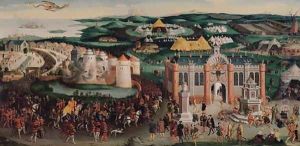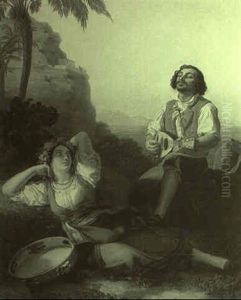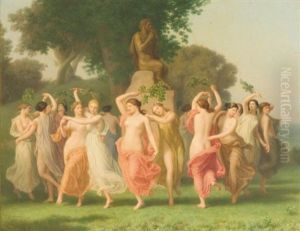Friedrich Bouterwek Paintings
Friedrich Bouterwek was a German philosopher, poet, and critic born on April 15, 1766, in Oker, a town which is now part of Goslar in Lower Saxony, Germany. He is less known for his artistic endeavors compared to his significant contributions to German idealism and aesthetics in the late 18th and early 19th centuries. Bouterwek studied at the University of Göttingen, where he was deeply influenced by the works of Immanuel Kant and Johann Gottlieb Fichte, philosophers who were central figures in German idealism.
Bouterwek's career was primarily academic, and he spent a great deal of his professional life as a professor at the University of Göttingen. His work initially focused on Kantian and Fichtean philosophies, but he gradually developed his own system of thought. Bouterwek sought to reconcile the ideas of his predecessors with his own notions of aesthetics and ethics, emphasizing the role of individual creativity and subjective experience. His contributions to philosophy include a comprehensive system of aesthetics, philosophy of history, and the development of a unique epistemology that sought to bridge the gap between empirical observation and rational deduction.
One of Bouterwek's major works is his 'Aesthetik,' published in 1806, which outlines his theories on the beautiful and the sublime, and discusses the relationship between art, nature, and human perception. He also authored 'Geschichte der neueren Poesie und Beredsamkeit' (History of Modern Poetry and Eloquence), a twelve-volume work that covers the history of literature and rhetoric from the ancient Greeks to the contemporary era of his time. This work is notable for its comprehensive scope and for Bouterwek's attempt to integrate literary criticism with philosophical aesthetics.
Despite his contributions to philosophy and aesthetics, Friedrich Bouterwek's work did not achieve the same level of recognition as some of his contemporaries. His ideas were overshadowed by the emerging dominance of Hegel's philosophy, which soon became the focal point of German idealism. Nevertheless, Bouterwek's work remains of interest to scholars in the fields of aesthetics, philosophy of literature, and the history of German thought. He passed away on August 9, 1828, in Göttingen, leaving behind a body of work that, while not widely known outside of academic circles, contributes to the rich tapestry of German intellectual history.





















